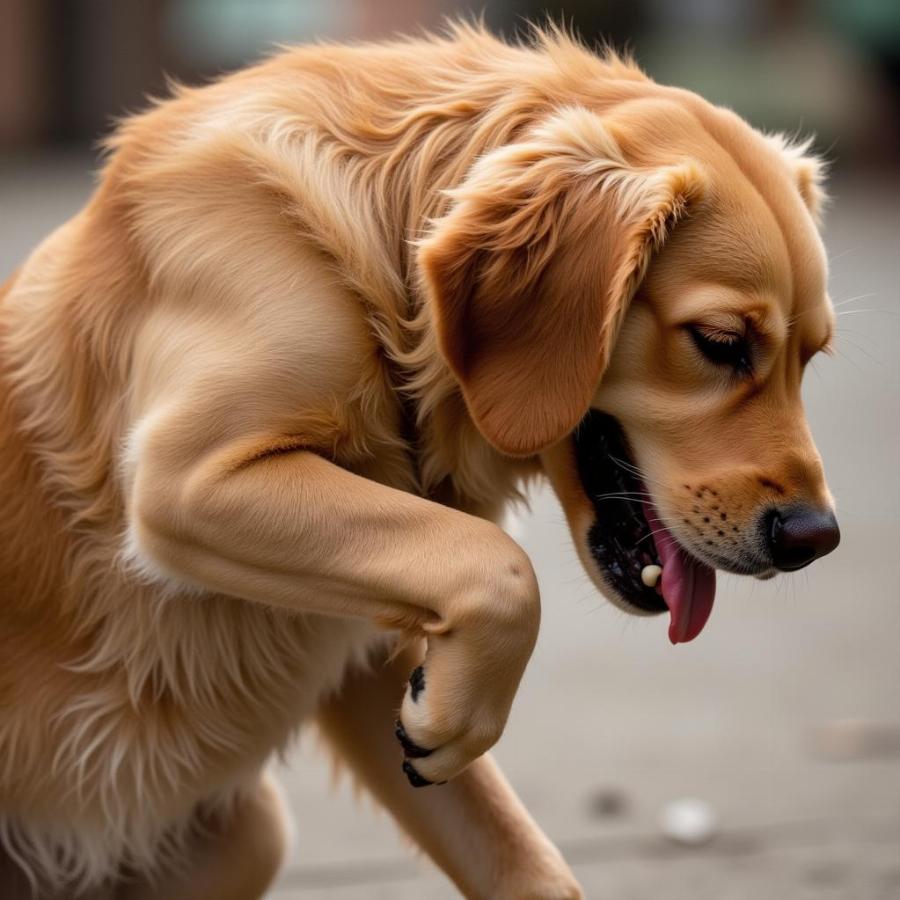Dandruff in dogs, also known as seborrhea, is a common skin condition that causes flaky, white or yellowish scales to appear on your furry friend’s fur. While it’s usually not a serious health concern, it can be itchy and uncomfortable for your canine companion. Understanding the causes of dandruff and knowing how to address it can help you keep your dog’s skin healthy and their coat shiny.
What Causes Dandruff in Dogs?
Just like in humans, dandruff in dogs can stem from various factors, ranging from environmental triggers to underlying health conditions. Let’s explore some common culprits:
- Dry Skin: One of the most frequent causes of dandruff in dogs is dry skin, often exacerbated by low humidity, especially during colder months.
- Allergies: Allergies to food ingredients, environmental allergens like pollen or dust mites, and even flea bites can lead to skin irritation and dandruff.
- Parasites: Mites, fleas, and lice can infest your dog’s skin, causing inflammation, itching, and excessive scaling.
- Nutritional Deficiencies: A diet lacking essential fatty acids, particularly omega-3 and omega-6, can contribute to dry, flaky skin.
- Hormonal Imbalances: Conditions like hypothyroidism, where the thyroid gland doesn’t produce enough hormones, can manifest as dry skin and dandruff.
- Infections: Bacterial and fungal infections can also cause skin inflammation and dandruff.
 Dog scratching due to dandruff
Dog scratching due to dandruff
Identifying Dandruff in Dogs
Recognizing the signs of dandruff early can help you address the issue promptly and prevent it from worsening. Here’s what to look out for:
- White Flakes: Noticeable white or yellowish flakes on your dog’s fur, resembling tiny specks of dust.
- Excessive Scratching: Your dog might scratch, lick, or bite at their skin more frequently than usual.
- Hair Loss: In more severe cases, dandruff can be accompanied by hair loss or thinning of the coat.
- Redness or Inflammation: The affected skin might appear red, irritated, or inflamed.
Treatment Options for Dog Dandruff
Treating dandruff in dogs involves addressing the underlying cause and managing the symptoms. Your veterinarian can help determine the best course of action for your furry friend, which might include:
- Medicated Shampoos: Special medicated shampoos containing ingredients like salicylic acid, benzoyl peroxide, or chlorhexidine can help exfoliate the skin and control bacterial or fungal growth.
- Topical Treatments: For localized areas of dandruff, your vet might recommend topical creams, ointments, or sprays containing anti-inflammatory or antifungal agents.
- Dietary Changes: Switching to a high-quality dog food rich in omega-3 fatty acids can improve skin health and reduce dandruff.
- Parasite Control: Regular flea and tick prevention is crucial to rule out parasites as a contributing factor.
- Addressing Allergies: Identifying and managing allergies through dietary changes, medication, or allergen-specific immunotherapy can alleviate skin irritation and dandruff.
Home Remedies for Dog Dandruff
In addition to veterinary care, several home remedies can help soothe your dog’s skin and manage mild cases of dandruff:
- Oatmeal Baths: Oatmeal possesses soothing and anti-inflammatory properties. Adding colloidal oatmeal to your dog’s bathwater can help relieve itching and reduce dandruff.
- Coconut Oil: Applying a small amount of coconut oil to your dog’s skin can moisturize dry patches and alleviate flakiness. However, avoid excessive application as it can make the coat greasy.
- Apple Cider Vinegar Rinse: A diluted apple cider vinegar rinse (one tablespoon per cup of water) can help balance the skin’s pH and reduce dandruff. However, avoid using it on broken or irritated skin.
Preventing Dandruff in Dogs
While not all causes of dandruff are preventable, some measures can help minimize the risk:
- Regular Brushing: Brushing your dog’s coat regularly removes loose fur and dead skin cells, promoting healthy skin and coat.
- Balanced Diet: Feeding your dog a balanced and nutritious diet is essential for overall health, including skin and coat condition.
- Hydration: Ensure your dog has access to fresh water at all times to stay hydrated.
- Humidifier: During dry months, using a humidifier can add moisture to the air and prevent dry skin.
When to See a Vet
While home remedies can be helpful for mild cases, it’s crucial to consult your veterinarian if:
- Your dog’s dandruff is severe or doesn’t improve with home care.
- Your dog’s skin is red, inflamed, or appears infected.
- You notice any signs of discomfort or distress in your dog.
FAQs About Dandruff in Dogs
Can I use human dandruff shampoo on my dog?
It’s best to avoid using human dandruff shampoos on dogs as they can contain ingredients that are harmful to canines. Always opt for shampoos specifically formulated for dogs.
Is dandruff in dogs contagious?
Dandruff itself is not contagious, but underlying conditions like some parasitic infections can be. It’s always best to consult your veterinarian for a proper diagnosis and treatment plan.
Looking for More Advice on Dog Care?
For more helpful tips and expert advice on all aspects of dog ownership, visit Beaut Dogs.
Need personalized support for your furry friend? Contact our team at [email protected], and our experts at Beaut Dogs will be happy to assist you with detailed and accurate information.